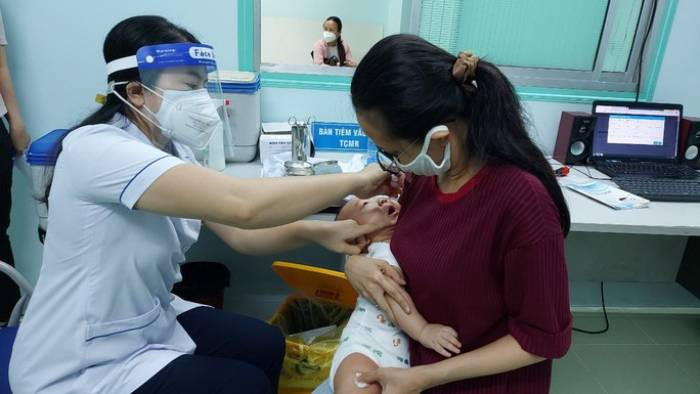
The HCM City Health Department has reported a shortage of six vaccines for an expanded immunization program, informing measles, DPT (diphtheria, whooping cough, tetanus), Japanese encephalitis, tuberculosis (BCG), measles-rubella (MR) and DPT-VGB-Hib (SII 5-in-1 vaccine). Supply of single measles vaccine and DPT has stopped since May 2022.
According to the department, there are 26,770 BCG vaccines left. The city needs 9,440 doses a month. It is expected that 17,330 doses would be left by the end of October, which is enough for 1.8-month use. As such, the city will lack vaccines from mid-December for the expanded immunization program.
As for Jevax (Japanese encephalitis vaccine), there are still 4,290 doses in stock. If noting that HCMC needs 6,340 doses a month, it would lack vaccines from mid-October.
There are 600 doses of MR vaccine and the city needs 5,690 doses each month. The shortage has been reported since early October. A shortage of oral poliomyelitis vaccine has existed since mid-October.
HCM City has not received additional vaccines within the expanded immunization program.
Do Van Dung, Dean of the Faculty of Public Health, HCM City University of Medicine and Pharmacy, said that if the problem is not solved in the next three months, it will be dangerous, causing whooping cough and diphtheria epidemics among children.
If a vaccine shortage lasts a short time, the risks will be lower because the number of people to be affected won’t be too high. However, the longer the vaccine shortage lasts, the higher the risk will be. Many diseases are circulating, and vaccination is the key to prevent diseases, Dung said, pointing out two risks.
First, this would lead to an increase in the risk of getting infected with diseases, such as measles and whooping cough.
Second, this would cause distrust among the public. Parents would possibly not have trust in the expanded immunization program.
Dr. Khanh said that lacking vaccines for the expanded immunization program is ‘unacceptable’. He said that after two years of the Covid-19 pandemic, the child vaccination rate is lower than expected because of social distancing.
Meanwhile, the national expanded immunization program has been affected by interrupted vaccines supply. Thus, the risk of epidemic outbreak is very high.
Ngoc Trang